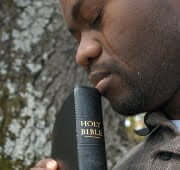
is a word that is widely used—and widely misunderstood. If you were to
ask the average person for a definition of integrity you’d probably
hear a lot of hemming and hawing. The origin of the word makes its
meaning very clear. “Integrity” comes from the Latin adjective integer,
which means “whole” or “complete.” In mathematics, an integer is a
positive or negative whole number or zero—a number without any
fractional part.
A person of integrity is honest and upright. His soul is not divided or compartmentalized.
One synonym for integrity is “sincerity”—the state of being truthful,
genuine and free of deception or duplicity. The word sincerity comes from the Latin sincerus, meaning “clean and pure through and through.” The Latin sincerus comes from two Latin root words, sine (“without”) and cera (“wax”).
Tradition tells us that dishonest Roman sculptors would cover up nicks
and flaws in their statues with a wax filler. The deception would last
only until a hot summer sun melted the wax and exposed the flaws. A
sculpture that was pure and flawless was said to be sine cera, or “without wax.”
In the same way, a human life that is pure and whole is sine cera.
The person who lacks integrity has hidden flaws in his character that
will inevitably be exposed by the heat of trial and adversity.
Only those who are honest and sincere in their character can stand the
heat of a thorough examination of their lives. As the Bible tells us, ”
He who walks with integrity walks securely, but he who perverts his
ways will become known” (Prov. 10:9, NKJV).
People of integrity don’t abandon their values and principles under
pressure. They know that times of adversity and temptation are
precisely when values and principles matter most. They keep promises.
They fulfill obligations. They maintain their honor even when it is
costly to do so.
Your integrity is the most profound expression of who you are.
Integrity is the ultimate expression of your relationship with
yourself, of a vow that you make to yourself about the kind of person
you choose to be. If you compromise your integrity, you may get away
with it for a while, but no one gets away with it forever. People who
lack integrity are eventually exposed.
To be a person of integrity, you must stand for truth and righteousness
at all times—even when you are under fire, in extreme temptation, in
times of loneliness and solitude, and great need, suffering and want.
If your integrity is something you can put on and take off like a suit
of clothes, it’s not integrity at all. It’s just a disguise to hide the
person you really are.
Optimize magazine published this succinct description of integrity in its May 2005 issue:
The 10 Universal Characteristics of Integrity:
1. You know that little things count.
2. You find the white when others see gray.
3. You mess up, you fess up.
4. You create a culture of trust.
5. You keep your word.
6. You care about the greater good.
7. You’re honest but modest.
8. You act like you’re being watched.
9. You hire integrity.
10. You stay the course.
“‘Integrity’ is the word for our times,” says James Dobson, founder of
Focus on the Family. “It means keeping our promises, doing what we said
we would do, choosing to be accountable, and taking as our motto semper fidelis—the promise to be always faithful.”
Charles Colson, founder of Prison Fellowship Ministries, told me about
a conversation he had with a Marine. He was speaking to the 2nd Marine
Division in Camp LeJeune, N.C. After he spoke, a sergeant major asked
him a question: “Mr. Colson, we’re Marines. We live by the creed semper fidelis—always faithful. Which is more important, loyalty or integrity?'”
Colson was impressed. “Wow! That gets to the heart of it, doesn’t it?”
he said to me. “Most of us can think of times when our loyalty to
someone may bring us into conflict with our integrity. What then?”
Colson answered the sergeant major: “Loyalty is a virtue if you are
loyal to that which is true. If you give your life and your loyalty to
a lie, you’ll be destroyed. So integrity is the prime character quality
that every individual needs above all. If we keep our integrity, then
all the other character traits, including loyalty, will fall right into
line.”
Pat Williams
is senior vice president of the NBA’s Orlando Magic and one of
America’s best-known sports executives. He drafted Charles Barkley and
Shaquille O’Neal, and 12 of his former players have become NBA head
coaches. He is the author of more than 50 books. As one of America’s
top motivational speakers, he travels the U.S. speaking to companies,
associations, churches and schools. For information about scheduling
Pat, click here.











































